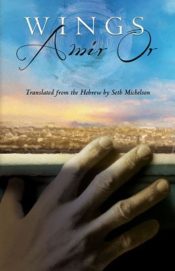 Amir Or
Amir Or
translated by Seth Michelson
Sagging Meniscus ($22)
by Kenneth J. Pruitt
Reading poetry in translation always puts one in the position of wondering what one is missing. The nuances of cadence, the resonances of sound, and, most obviously, the subtleties of meaning all risk being sacrificed at the altar of wider readership beyond the poet’s native tongue. Wings, a bilingual edition of Israeli poet Amir Or’s thirteenth book of poems, demonstrates that this in-between-ness might be exactly what we need right now. The book is laid out with the English translations on the right acting as the mirror reflections of their Hebrew originals on the left, and since these two languages read in opposite directions, the reader gets a visual sense of the act of translation—quite a nifty trick.
Over two major parts of the book with several sections each, Or weaves themes of the multiplicity of the self, religion (although the author himself is a secular humanist), creation, nature, and the baselessness of time. At times, each section can feel like a methodically crafted poem cycle. At others, as with the first section, “Morning Poems,” the sections seem to act as windows onto the poet’s writing process, where each poem feels like a draft of another.
Another of the more notable sections of the book is “The Journey (A Diary).” Or carries the reader through not only different landscapes, but also the days of the week, ending the section with the title poem, “Wings,” here in its entirety:
Spread your wings, dear one, and look
around you at this beloved world—
don’t let your spirit fail.
Even in the depths of darkness
remember: you’re flying to the light.
After several more sections spent ruminating on spirituality, Or really hits his stride with “Poems of Reckoning,” the last section. Deftly using images and themes introduced throughout the book, the poetics here underscore polemics, as in “Tomorrow,” maybe the best poem in the collection: “For what we will be is all that we bit into— / the flesh of the poor, immigrants, Arabs, the old; / and we have no I except the ones we are— / where we looked for mercy, we found none.” The self as multiplicity, the failure of religion, the collision of past, present, and future: philosophical ideas are stitched together here to bolster an overtly political poem.
This is how poetry is useful. This is how poetry does something. With this newly translated edition of Wings, Amir Or is finally able to open a dialogue with readers in the United States. May we respond to the invitation.
